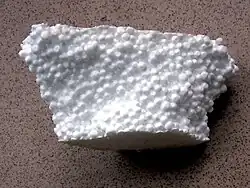isopor
English
Etymology
iso- + Ancient Greek πόρος (póros, “journey”), on the basis that isopors are "lines of equal travel".
Noun
isopor (plural isopors)
- (geomagnetism) A line on a map that joins places of equal annual change in a geomagnetic property; an isoporic line.
Related terms
Anagrams
Portuguese

isopor
Etymology
From Isopor, a trademark used by BASF and later by Knauf, German companies that sold the product in Brazil.
Pronunciation
- (Brazil) IPA(key): /i.zoˈpo(ʁ)/ [i.zoˈpo(h)]
- (São Paulo) IPA(key): /i.zoˈpo(ɾ)/
- (Rio de Janeiro) IPA(key): /i.zoˈpo(ʁ)/ [i.zoˈpo(χ)]
- (Southern Brazil) IPA(key): /i.zoˈpo(ɻ)/
- Hyphenation: i‧so‧por
Noun
isopor m (plural isopores)
- (Brazil) expanded polystyrene, styrofoam
- Synonym: (Portugal) esferovite
Synonyms
This article is issued from Wiktionary. The text is licensed under Creative Commons - Attribution - Sharealike. Additional terms may apply for the media files.